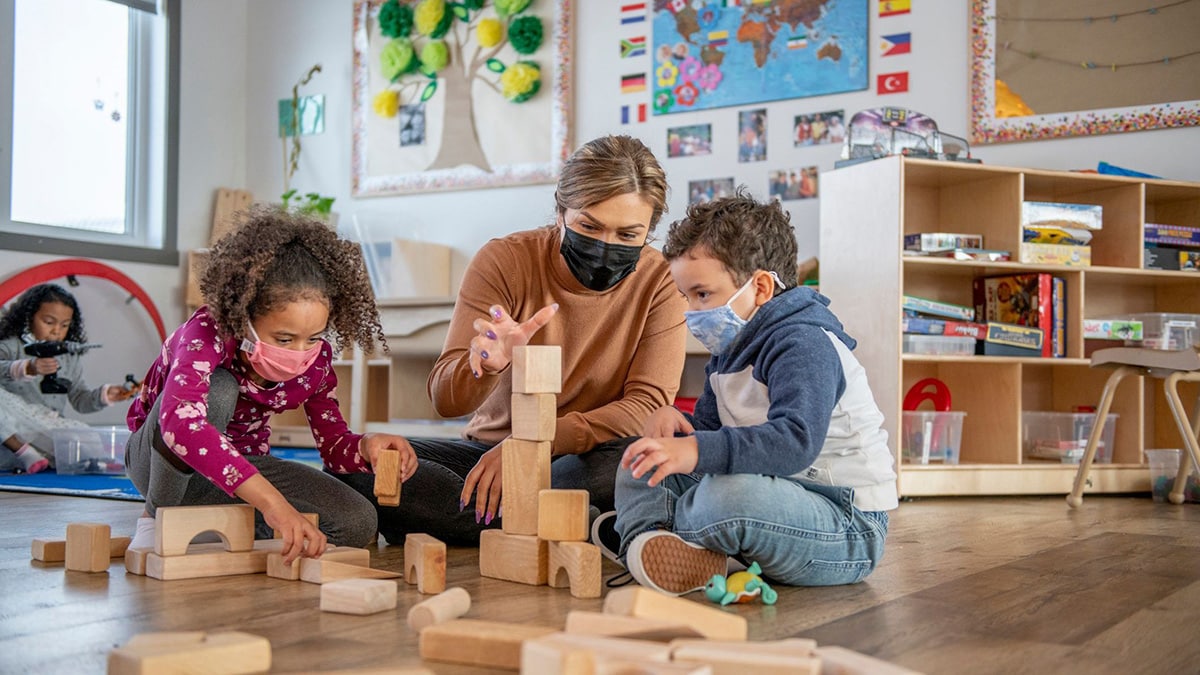At a glance
Early care and education (ECE) providers are on the front lines of public health – protecting and nurturing children, teaching healthy behaviors, and supporting parents. Learn what CDC is doing to support ECE providers in their important work.

Nuturing, supporting, and monitoring child development
Many parents (including other caregivers who hold the role of parent) need someone who is caring and supportive to look after their child. Whether in a childcare center, family home, or in individual care, ECE providers are a key part of the infrastructure in any community. By caring for children, ECE providers help support parents who are working to provide for their family. ECE providers are sources of nurturing care that allow children to feel safe and protected when away from their parents and other caregivers.

But ECE providers give much more than care. They support children's development by helping them learn, explore, and get along with others. By supporting healthy eating and physical activity, ECE programs can support healthy growth and development, obesity prevention, and lifelong health. ECE providers can also monitor children's developmental milestones and help them build other needed skills. High-quality ECE programs can make a difference in children's development that can last a lifetime. This type of support is particularly important for children who are exposed to adverse childhood experiences and factors that put them at a disadvantage. Children who need additional support because they are at risk for or have developmental delays or disabilities can receive needed services and early intervention from ECE providers, whether in childcare centers, family home care programs, or through home visit services.
Protecting children from injuries and diseases
ECE providers play a major role in protecting children from injuries and diseases. ECE providers can help make sure that their programs are located in safe places, keep children safe from serious injuries and harm while in their care (such as ensuring playground safety and water safety), and protect children by putting medication up and away.

The COVID-19 pandemic has shown that ECE providers can take many precautions to keep infections from spreading, for example, by improving ventilation and hygiene. In ECE settings, caring for young children means holding them, as well as assisting with diapering, feeding, and tooth brushing. This means many ECE staff are coming into close contact with children and need cleaning, sanitizing, and disinfection tools to help protect the health of children in their care as well as themselves and their own families. By carefully planning and following guidance, ECE programs can prevent outbreaks of infectious diseases such as shigellosis.
ECE providers can teach foundational skills about staying healthy and keeping safe from germs. Many parents get great support from ECE providers around teaching children toileting, hand hygiene, and healthy habits to prevent respiratory disease. ECE providers can also play a role in protecting children during disasters by planning and preparing for emergencies. ECE providers can also watch for signs that children are not supported at home.
Supporting parents
In their role as nurturers, ECE providers often feel like part of the child's extended family. As a trusted professional, ECE providers can provide tips on positive parenting and family engagement healthy habits, and important ways to protect children's health, such as getting regular well-child checkups. Some ECE programs such as Head Start can also help parents get connected to other services such as food assistance through WIC and SNAP.
With the COVID-19 pandemic, the importance of staying up to date on vaccinations to protect everyone from vaccine-preventable diseases has become very clear. ECE providers can promote vaccines by
- Sharing information with parents and caregivers about routine vaccinations and protecting children, families, and communities against vaccine-preventable diseases.
- Finding ways to support child vaccination: Supporting the Child Vaccination Decision Process—Better Kid Care | Penn State Extension
- Helping families who want to make shots less stressful by sharing simple ways to support their child before, during, and after shots
Supporting early care and education providers
ECE can improve children's development and act as a protective factor for lifelong health. ECE programs can counteract the disadvantages some children experience, improve their social and cognitive development, and help provide them with a more equal opportunity to achieve school readiness, as well as lifelong employment, income, and health. To do this important work, ECE providers need support and resources. CDC works with partners to understand how to help ECE providers support children and families.
CDC provides resources for ECE providers, which can be accessed through the Early Care and Education Portal. These resources include free trainings, such as:
- Adverse Childhood Experiences (ACEs) Online Education Training: Provides training to understand, recognize, and prevent ACEs.
- Family Interaction Training (FIT) Program: Provides information for early childhood professionals to implement the Family Interaction Training (FIT) to help parents of young children with disruptive behavior.
- Healthy Kids, Healthy Future — On Demand Modules in English and Spanish: Provides practical strategies for implementing best practices in early childhood settings for promoting healthy weight in young children.
- GO NAPSACC — Nutrition and Physical Activity Self-Assessment for Child Care: Provides information about how to build healthy eating and physical activity habits in children through easy-to-use online tools.
- Watch Me! Celebrating Milestones and Sharing Concerns Online Training: Provides tools and best practices for monitoring the development of children in ECE programs and talking about it with their parents.
- Clean Hands and Spaces — Web-Based Training: Provides important information and strategies for keeping hands and surfaces clean in educational settings.
- TRAIN Learning Network: Provides a comprehensive catalog of public health training opportunities.

Taking care of children requires a lot of effort and includes many challenges. CDC provides resources to support ECE providers, including the following:
